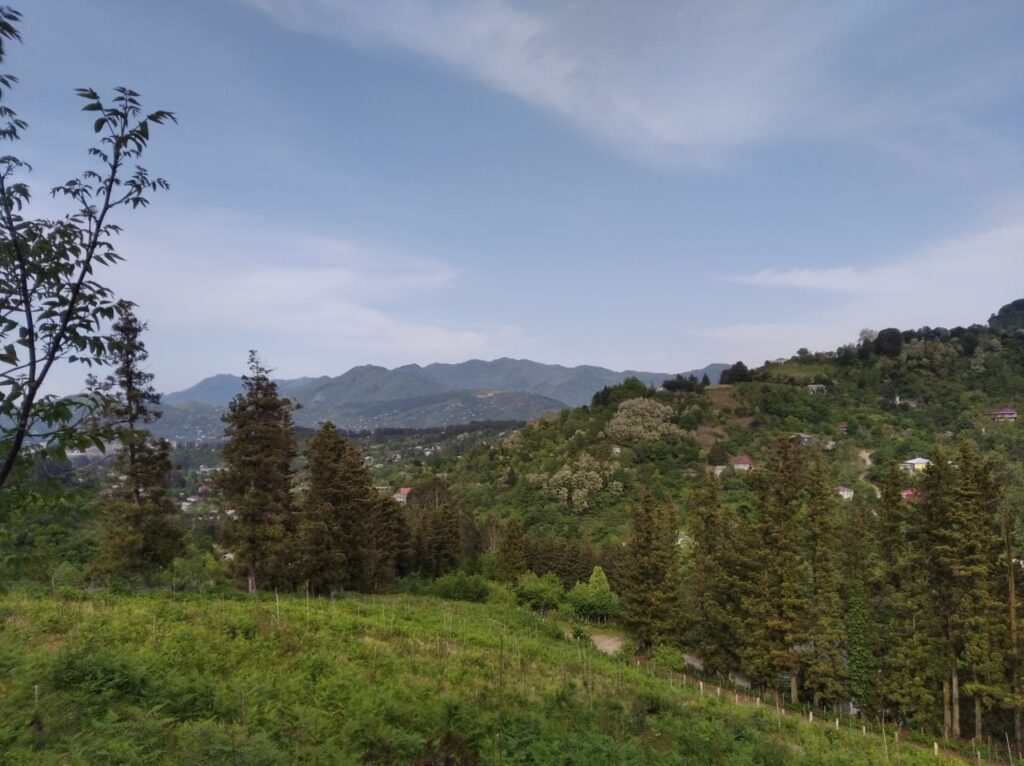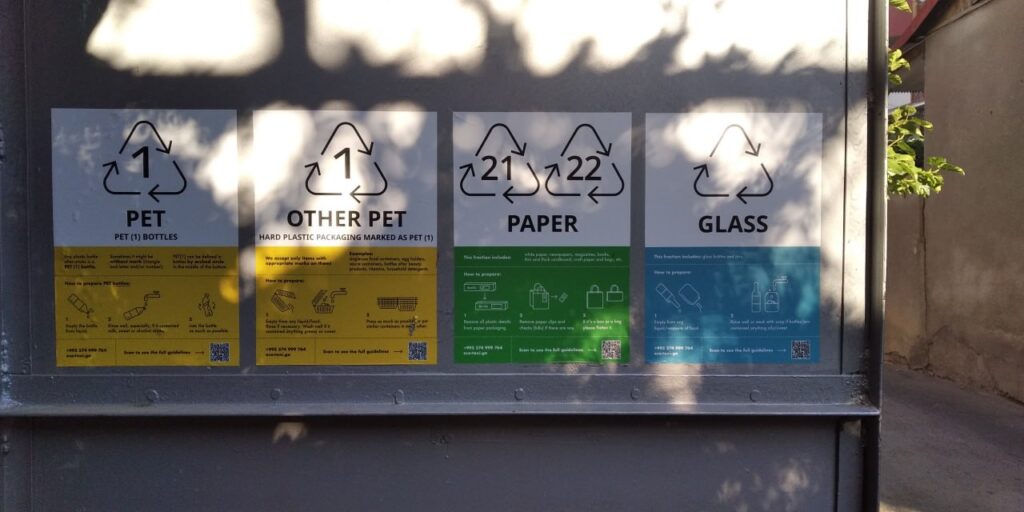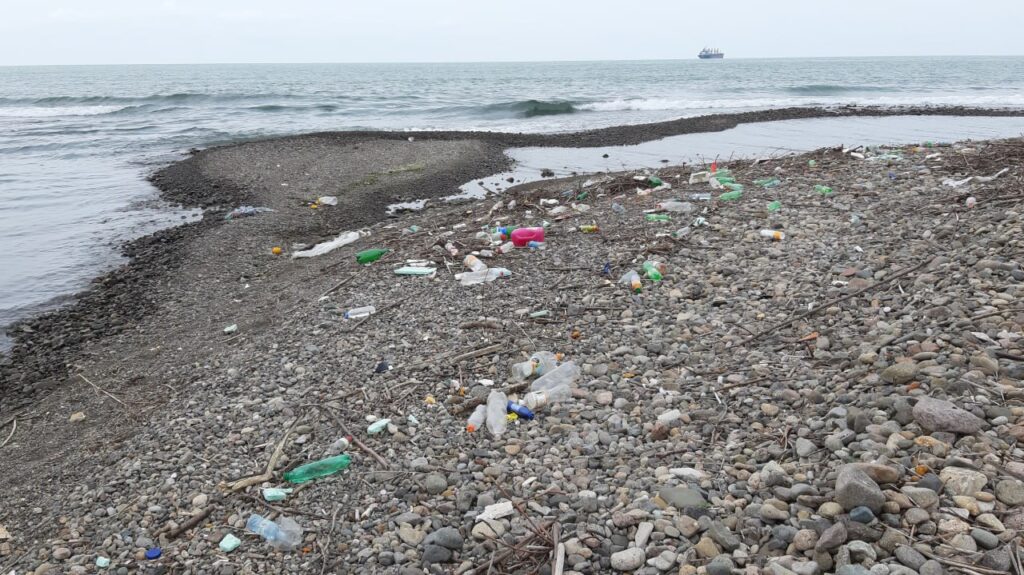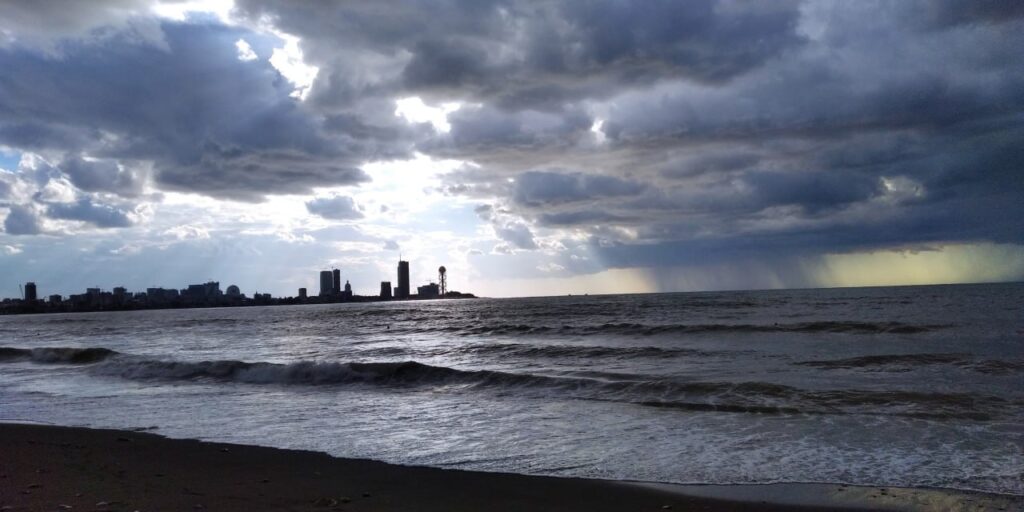How does eco-activism differ in various post-Soviet countries? What environmental problems are most relevant for this region?
Today we have a special edition: “Not Today, Not Yesterday, Not Tomorrow” talked to activist Aleksey, who found himself in emigration twice: first in Ukraine, and then in Georgia.
Hello, tell us about yourself? Why did you emigrate?
My name is Aleksey. I have been away from Belarus for almost two years, but I don’t consider myself an emigrant. So, now it is easier to deal with ecology and climate change issues outside the country, as in 2021 almost all ecological and environmental organisations were liquidated – from eco-house to the protection of birds of the Fatherland. It was a significant blow to the environmental movement, as we can say that all the working tools in the country were destroyed.
In Belarus, I was more involved in environmental journalism. Now I also continue working with the media, but I am also trying to make decentralised ecological (and not only) communities more sustainable and adaptive to changes than the vertical system.
Those experts, activists and journalists who stayed in Belarus had to accept the “rules of the game” – less publicity, no critical remarks, more cautious approach to statements. Such conditions were unacceptable for me because issues of climate change and ecology need to be discussed loudly and without fear so that more people can hear them.
At that time, I was not involved in field observations much, mostly working in the media, so it wasn’t difficult to leave the country. But I believe it was not emigration since there was no goal to go somewhere to legalise. It was and is a journey that allows continuing work and better understanding the ecological and climate challenges our region faces today.
In my opinion, modern climate change is a challenge not only to nature, but also to human society. What is happening in the world is unlikely to lead to the scale of the Permian extinction, but the world will certainly change. Yes, the global human civilization, and with it the ecosystems we are familiar with, may disappear. And this will be the result of the Anthropocene – the actions of man himself. After all, it is unrestricted industrial growth that has led to climate change.
The existing mechanisms of interactions in society, both between people and with nature, as we see, do not work. They lead, for example, to the exploitation of the global South, from which climate migrants flee to the North, as well as to inequality, to a pandemic, and a potential world war. In my opinion, the solution may be the formation of new mechanisms of interaction, a new cultural environment. In other words, a new cultural ecology for humans that will develop in harmony with nature and adapt more easily to changes.

What is the current eco-agenda for Belarus?
In Belarus, the same significant questions remain today as a few years ago. Unfortunately, the work to address them is being carried out more remotely.
I am particularly concerned about the fate of Polesie. This region has suffered a lot from anthropogenic factors. We can mention not only land reclamation, but also plans for the construction of the E-40 waterway, which had to be stopped only with the help of environmental organisations.
It is important to point out that Polesie is located in the zone of changing climatic belts, so there is a change of temperatures, and new species come here from the South. And not only invasive ones brought by humans. In recent years, Polesie has seen, for example, jackals and tarantulas. Birds from southern regions come here more often. Changes in the composition of forests are also noticeable here.
Also in the Gomel Region, active processes of depletion are taking place in some areas. Ecosystems are changing here, and they are very unstable. Therefore, it is necessary to work with a specialist who has the ability not only to observe but also to identify changes.
More nature protection areas should be opened in Polesie and cross-border projects should be realised. But, after the liquidation of environmental and conservation organisations, all these important processes were put on pause in 2021.
Following the widespread Russian invasion of Ukraine, we also see militarization of the regions. This is an additional blow to ecosystems, so in my opinion, the issue of Polesie is one of the main ones in Belarus, but certainly not the only one. There is also the Belarusian nuclear power plant, which has not disappeared anywhere, and the waste will have to be stored, and the issue of using agricultural areas, and the issue of building new factories, and the issue of waste…. For the time being, it is rather difficult to influence it, as public associations in the country have no weight, and the public community is almost destroyed.
– When do you think visible ECO changes will start in Belarus? Is society ready and conscious enough? Or is it still tired after the events of 2020?
In my view, visible changes will occur when the country joins ambitious plans for climate change adaptation at the state level. For example, committing to and achieving carbon neutrality or implementing reforms comparable to the Green Deal. I believe this will happen when people come to power who do not think in terms of GDP growth and do not speculate on the “Soviet” past. When decisions will be made by those who not only see, but realise that we are living in a time of climate change. That it is possible to adapt only when we make changes in our values, in our consciousness.It is clear that this can only be young people who will take responsibility for the country.
One of the most popular forms of Belarusian activism is petitions. What do you think, do they work?
– Many people are sceptical about this mechanism, but it is something that is necessary and important to do. When we write petitions, we create a tool. That gives more opportunities to those who are interested to do something. And I think that from time to time petitions in the country can work. There are such examples.
Belarus is still a republic de jure, and on an ideological level, there is still a belief in the power of society. Strangely enough, looking at the processes in the country. By creating tools, we provide opportunities for those interested in making changes in the country. This was the case in Soviet times, and it functions in totalitarian countries when people use all tools and opportunities to change the situation. These are not systemic changes, which are very important and probably not the main ones, but it helps change the situation step by step. It pushes for systemic changes.
And I think there are those among the officials who are interested in change and can use petitions at one point or another (maybe not even expected). So yes, my advice is to write petitions.
It should be added that besides petitions in Belarus, there are international petitions. For example, on the recognition of ecocide at the international level. AVAAZ is involved in one of such petitions. This is also a tool that can be used. So when we write and sign petitions, we create a tool. To use it, you need time, place, and situation.

You live in Georgia, what agenda is relevant for Georgia?
The main problem, in my opinion, is spontaneous pollution of territories and the lack of sustainable planning. A large amount of household waste, from plastic bags to even tires, can be seen around any Georgian settlement or along roads.
This is probably due to the low level of environmental awareness. The educated and the most active go first to Tbilisi and then try to go to Europe. Not so many come back. This is a problem for the countries of our region in general. But my experience of communication with Georgian youth has shown that they are interested in a meaningful approach, so there will be changes.
Regarding the lack of sustainable planning, it is necessary to acknowledge that short-term benefits currently overshadow long-term considerations in society. There is a desire to earn money quickly, without thinking about quality. Therefore, construction happens without a plan, and land is used without considering the future. As a result, disasters occur, as was the case this year at the Shovi tourist resort in Racha.
It takes time for something to be solved. We need educated and active people to stay in the country. They should take a more active part in decision-making and planning. For this it is necessary to create conditions for them. But it is also necessary that they are interested in working for their society.
Rivers are a big environmental issue for the country. Water is generally perceived here as an infinite resource that can be used without thinking. The last collection of data for the water registry here took place back in Soviet times. But rivers in Georgia are an element that can be dangerous. Again we can remember the tragedy in Shovi. At the same time, there are plans to build hydroelectric power plants, to change landscapes and ecosystems. Without a sustainable plan, this will lead to new disasters.
But in general I am quite positive about the environmental future of the country. There is a movement here and I hope it will only grow stronger. For example, the Tbilisi initiative “My CITY is Killing Me” / pachynaემი .ალაიი მალავს started the fight for air quality. Tbilisi is the only one of the most polluted cities in Europe in terms of air quality – but it is now doing many different environmental and social projects. I have a good impression of Green Alternative, which works as an excellent environmental non-governmental organisation, bringing together both activists and experts, and the EcoCentre organisation from Rustavi. There are organisations not only in Tbilisi. For example, RicDog from Kutaisi.
– And what forms of protest exist in Georgia? Are there any threats to Georgia’s natural resources?
Protests in Georgia are a form of communication between society and the authorities. If something displeases society or a community, they protest and achieve their goals. This was evident during the protests against the construction of the Namakhvani HPP on the Rioni River in 2021, where people succeeded in their efforts.
Getting people to protest can be difficult, but if it happens, there is no stopping them. Unfortunately, I have not heard about climate marches in Georgia, but I hope they will take place soon. After all, there are problems in the country caused by climate change.
As for the threat to natural wealth, the main problem here, as I have already said, is the lack of a sustainable plan for the use of resources. But, in my opinion, Georgians are still respectful of nature conservation areas.
My hypothesis is that what belongs to wildlife they try not to touch. For example, it is quite easy to meet a bear in national parks or forests here. Jackals generally come down to the villages. When you find yourself in the forests, you realise that they are actually wild. And although my Georgian acquaintances talk about illegal logging, which leads to the same landslides, so far my feeling is that Georgia has the potential to preserve really wild, untouched nature.
The impact of climate change on the country should also be mentioned. This year there was a big heat wave in summer, and in autumn and winter we are expecting big rains. All this affects quite active ecosystems of mountains and rivers. Which could lead to new disasters. Unfortunately, this is not talked about much. I think we need to work more actively with climate agendas in Georgia.
I saw humane treatment of street animals in Georgia; could you tell me more about it?
I wouldn’t call these relationships “applied.” Georgia is a southern country, and many aspects of what happens here can be observed in Spain or even in India. Yes, there are many dogs and cats on the streets, but the conditions are quite difficult.
Firstly, you can see quite a few purebred dogs, especially hunting breeds. From time to time they are thrown away by their former owners and end up on the streets. In general, there are quite a lot of dogs that look like they were born in people’s homes. I have seen both marvellous huskies and breeds with quite a difficult temperament, such as alabais. It is clear that these dogs do not belong on the street.
Secondly, unfortunately, the same street dogs are not properly cared for. Even sterilisation is occasionally carried out without the necessary attention and the dogs suffer. As far as I know, there is no open register of information about chipped dogs, no emergency vaccination is carried out.
However, the good thing is that dogs and cats live on the streets. People interact with them, and most of them are quite friendly. It is also essential to note that Georgians feed them, so no one dies of hunger. They make houses for them. They give them water in the heat. It is hard for me to imagine how it is possible for someone in Georgia to die of hunger. People here support each other, they do not close themselves off. This is what I think both Belarusians and Western Europeans should learn. Friendliness and openness.

– Did you also live in Kiev? Tell us about the eco-movement in Ukraine? What was the agenda before the war? And what is the order now?
My impressions of environmental activists in Ukraine are the best. In my opinion it is quite a powerful movement, which is well represented both at the level of a non-governmental organisation and at the level of “grassroots activists”.
Almost all the demands that are related to ecological lifestyle could be used before and can be used now: the “Ukraine Without Waste” initiative allows to reduce waste emissions to almost zero and accepts a large number of factions, there are good projects on volunteering, support for Degrowth initiatives. I was very impressed by how Ukrainians collected rations for vegans at the front. You can see that the country is moving towards European values, and the ecological system is one of the main European values today.
When I got to Ukraine in autumn 2021, I found myself at the climate march. There I met representatives of Ecodyia, one of the big Ukrainian environmental organisations. Then I met other organisations, such as a Ukrainian environmental group. Everywhere I met polite people with whom I still keep in touch. That is why I see the future of Ukraine today only “green” and sustainable. Ukrainians are proving it with their work, their approach to life and their fight against invaders.
After the start of Russia’s full-scale invasion, the environmental movement in Ukraine surprised me again in a good way. In addition to the great solidarity, all the actions that were related to the war also focused on environmental and climate issues. For example, there has been a big initiative to respond from Russian carbon fuels to make the transition to renewable energy as soon as possible, prompting Europe to develop the Repower EU plan. During the last heating season, Ecadia launched a big programme to improve the energy efficiency of buildings. Active today is the discussion of projects to rebuild the country after the victory. For example, there are proposals to transfer the most affected areas to conservation status, so that the nature there will recover faster. If this happens, it will be a good sign for the neighbourhoods of the region. And it will also make Ukraine an example of “green” governance in Europe. I sincerely wish this and am ready to work for such a future. In my opinion, where Ukraine is, there is Belarus.
Are you also studying the ecological consequences of the Russian invasion? Tell us more about this project. What are the main ecological consequences of the invasion?
It’s a rather complex issue that I could talk about a lot. So it’s better to give two thoughts that are not so much talked about, but which are very important for understanding the situation.
Firstly, the environmental consequences of war will be long term. They will take decades to address. For example, the country is 40 percent mined, which closes a lot of forests, can lead to fires, raise new forest management issues. The country is very polluted from military equipment and shells. In general, what is happening in the east of the country is a real ecocide, destruction of large territories, which will be very difficult to restore.
So far, the world practice of recovery from such level of pollution has not had any. There are examples of the First World War and after it the same France simply left large territories to natural recovery. Left them to nature.
But there are questions here as well. So, the remaining territories are likely to be occupied by invasive species. What to do with them? Is Ukraine ready to convert its agricultural areas into a conservation state? Where will the resources to rebuild the country come from? There are many questions that we will discuss and solutions to which we will be looking for a long time.
Secondly, this war affects the ecology of the entire region. Belarus is already suffering from it, 20% of Georgia’s territories are still occupied, and in Central Asia, we see more active involvement of the nuclear resource lobby. Not to mention Russia itself, which may experience a genuine ecological collapse since environmental and conservation practices there will be destroyed. This can significantly impact, for example, the lives of indigenous populations and may undermine the global climate movement. We even see the consequences of this war in Africa, which has started extracting and selling more fossil fuels as Europe has turned away from Russian sources. However, a complete energy transition has not yet been achieved.
These are global consequences that all of us need to address. Therefore, it is essential to loudly declare that this is not just Ukraine’s problem—it is a problem for the entire universe because if we do not solve it, adapting to climate change will be impossible.
More about the ecological consequences of Russia’s full-scale invasion of Ukraine can be read on the UWEC Work Group website.

You have lived in these three countries. In your opinion, what are the similarities and differences in eco-activism? Where is society more aware and ready for change?
Eco-activists are like a family to me because they are people with similar views and a similar approach to life. It’s easier to be friends with those who, like you, do not consume meat, sort waste, try to reduce their carbon footprint, care about nature, embrace Degrowth ideas, and so on. So, I have no desire to compare. Everyone has their own issues, but the main thing is that we try to solve them together.
In Ukraine, there is a war, people are dying, including eco-activists, but there is a higher level of solidarity, and there are tools to pressure the government. In Belarus, people are more careful and, in my opinion, more accepting of environmental practices, but the more active people are now thrown out of their country and cannot influence it in any way. In Georgia people are more open, but if we talk about the whole society, the level of ecological consciousness is lower.
But together we can help each other to shed this “soviet” industrial past and make our lives better. In my opinion, the “green” future of the region is being forged today by all of us. So I am very proud that I have the opportunity to work with Belarusian, Ukrainian and Georgian people and environmental initiatives. I hope to soon have the opportunity to work with Moldovan, Armenian, Kazakh, Kyrgyz, Coralpakistani, Uzbek and other activists and experts from the region.
– There’s a lot of unstable, horrifying events in the world, have we completely taken our eyes off the global warming issue? But the problem hasn’t gone away, could you tell us what is happening on that front?
– Again a very big question that cannot be answered in two sentences. I can point out that while at the COP 26 summit in Glasgow in 2021 there was still some hope that the countries of the world would be able to reach an agreement, now I have no such hope. I approach these talks quite sceptically. But I also see how young people are forming a new movement that will solve the issues. So, there is hope, but it is unlikely that the ‘big uncles’ will be able to achieve it. Only we can.
Today, we already live in a time of high climate turbulence, and this is just the beginning. This July became the hottest on record in the history of global meteorological observations. We see a large number of wildfires, anomalously large areas are burning in a short time. We also see a high amount of precipitation. There will be more—more heat, more precipitation, and other abnormal phenomena.
I think it will be a rather gradual process, but we must understand that changes are happening, and we need to adapt to them. To understand this, there is no need to read extensive scientific studies—you can see it for yourself. Each of us, over the past two years, has experienced some abnormal phenomena, regardless of the country where he or she lives.
How can we help you? And any final words for the readers?
– I think the question here is how we can help those around us and ourselves, because that’s what matters. In my opinion – by creating decentralised communities, refusing to overconsume, refusing to eat meat, reducing our carbon footprint, and participating in environmental and climate initiatives. In general, by joining the environmental movement. How to do this and where to start are questions I can help you answer. I will leave my contact details in the editorial office, so if you have any questions, please do not hesitate to contact me.
As my friends say: Together we are united, we are invincible!”. So unite, help each other, make the world more sustainable and your life more meaningful.


